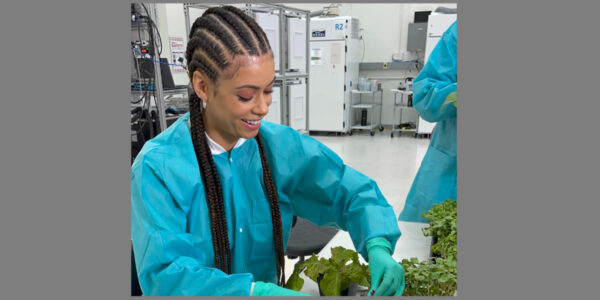Video: Miss Universe Ireland Is a Scientist ‘Normalizing Black Women In Spaces’ They’re ‘Not Often Seen’
A viral tweet showing a Black scientist wearing cornrows while preparing plants to go into outer space for NASA is turning heads and sparking a discussion about Black women in STEM.
“I had no idea it would go viral, I tweet often about representation, especially in the work that I do. It was really lovely to see the dialogue and conversation it ignited,” Fionnghuala “Fig” O’Reilly said.
O’Reilly, 29, regularly posts on social media showing herself working on science-related projects. The Irish-African-American — her mother is African-American and her father is Irish — carries many titles including an actress, model, television correspondent, scientist and 2019 Miss Universe Ireland, the first woman of color and Black woman to represent the country during the international pageant competition.
O’Reilly says she is using her platform to spotlight the importance of diversity in science, technology, engineering and math fields.
“I was very happy that this conversation around representation and normalizing Black women in spaces we’re not often seen is being had on a really large scale,” O’Reilly said of her viral tweet.
As O’Reilly was gaining a better understanding of her own place in the world, she also discovered a newfound passion, a love of science and math. As a teenager growing up in California, one of her high school teachers encouraged her to participate in the Math and Science Honors Academy at the University of California at Berkeley over the summer.
“This program exposed me to this entire world that I knew nothing about, and I found my passion,” O’Reilly said.
O’Reilly continued her engineering pursuits in college. She was accepted into George Washington University to study systems engineering.
It was during her tenure at George Washington University that O’Reilly was able to tap into another long-time passion of hers, fashion.
“I’ve always loved fashion. I’ve always loved beauty. I’m definitely a glam girl,” she said.
Little did O’Reilly know her passions were on track to converge. In 2012, O’Reilly competed for the George Washington University’s Miss Freshman Pageant. Since she was in ROTC at the time, she performed the manual rifle drill during the pageant as her special talent. She was crowned the winner.
“It felt like for the first time, I was bridging the gap between all of these various interests that I have, and I got to do something good with that,” O’Reilly said.
After graduating from George Washington University with an engineering degree and a pageant victory under her belt, she moved to Ireland.
Her understanding of her place as a Black woman with a passion for STEM and pageantry helped motivate her to compete in the 2019 Miss Universe competition which she won.
“I am so very proud to be the first Black woman to represent Ireland at Miss Universe,” O’Reilly said.
O’Reilly says she used her elevated platform to continue drawing attention to the increasing need for diversity in STEM, particularly from Black women.
As the history-making pageant winner turned heads with her beauty and advocacy, her career more closely related to her engineering degree landed her opportunities with NASA working as a datanaut, which is a data scientist.
In 2020, O’Reilly joined the CBS “Mission Unstoppable” science program spotlighting women scientists across the U.S.
She also founded a tech startup called Space to Reach. The program is focused on helping Black and brown women in STEM get STEM jobs. The program formally launches in January.
O’Reilly’s staunch push for diversity in STEM is heightened by the data. Black people make up 9 percent of the overall STEM workforce, according to Pew Research.
Salary disparities run deep in STEM careers, with Black women often paid the least. Pew Research also found Black women working in STEM made $57,000 on average, compared against white men who averaged $90,600 and Asian men averaging $103,300.
The layered conversations circulating online surrounding diversity in STEM and the need for more Black women are a delight for O’Reilly, who aimed to use her platforms to foster such dialogues. O’Reilly says she is being approached with increased frequency by women and girls praising her efforts to spotlight Black women in STEM.
“Even with this viral tweet, I’ve gotten a lot of responses that makes me feel really good about this work and that it’s truly helping,” O’Reilly said gleefully praising her continued efforts to spotlight Black women in STEM.

